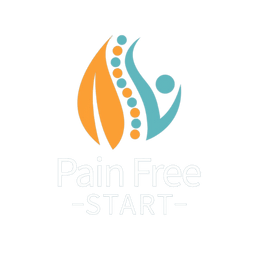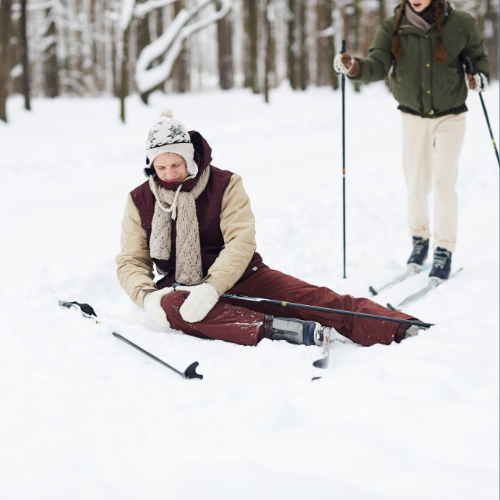Skiing is an exhilarating winter sport, but it comes with the risk of injury. Just a few days into January, I’ve already seen multiple skiing injuries in my clinic. The good news? Many of these injuries are preventable with the right preparation and techniques.
Here are the six most common skiing injuries and expert tips on how to avoid them, so you can enjoy the slopes safely.
1. Knee Injuries (ACL & MCL Tears)
Knee injuries are the most common skiing injury, making up 30-40% of all cases. The anterior cruciate ligament (ACL) and medial collateral ligament (MCL) are particularly vulnerable, especially when turning, stopping, or falling. These injuries often stem from fatigue and poor fitness.
Prevention Tips:
- Strengthen your glutes, hamstrings, and calves to balance the forces on your knees.
- Focus on proper skiing form and biomechanics.
- Avoid skiing while fatigued.
TOP TIP: Struggling with knee pain? Join my FREE Masterclass for expert advice and exercises to improve knee function.

2. Upper Limb Fractures (Wrist & Thumb Injuries)
It’s instinctive to extend your arms to break a fall, but this increases the risk of fractures, especially in the wrists and thumbs. Holding ski poles can worsen thumb injuries, leading to ligament tears.
Prevention Tips:
- Learn how to fall safely—avoid reaching out with your hands.
- Strengthen your core and upper body.
- Use wrist guards and well-fitted gloves for extra support.
3. Shoulder Dislocations & Injuries
Shoulder injuries, including dislocations, makeup 5-10% of skiing injuries and usually result from falls or collisions.
Prevention Tips:
- Strengthen your shoulders and upper body with resistance training.
- Practice safe falling techniques to minimise impact.
4. Head Injuries (Concussions & Trauma)
Head injuries account for 20-30% of skiing-related injuries and can have serious consequences. Wearing a helmet is non-negotiable.
Prevention Tips:
- Always wear a properly fitted ski helmet.
- Be aware of your surroundings to avoid collisions.
- Follow safe skiing practices, especially at high speeds.
5. Back Injuries (Strains & Spinal Issues)
Back injuries make up 5-15% of skiing injuries. A strong core is key to maintaining balance and preventing excessive strain.
Prevention Tips:
- Strengthen your core with Pilates-based exercises.
- Maintain proper posture and body alignment while skiing.
- Warm up thoroughly before hitting the slopes.
TOP TIP: Struggling with back pain? Enroll in my FREE Masterclass for essential strategies to build a strong, pain-free back.

6. Lower Leg Strains & Achilles Injuries
Lower leg injuries, including Achilles tendon ruptures, tibial fractures, and plantar fascia pain, are common among skiers. Poorly adjusted ski bindings can contribute to these issues.
Prevention Tips:
- Ensure your ski bindings are properly adjusted.
- Strengthen your foot, ankle, and lower leg muscles, including the soleus and tibialis anterior.
- Stretch and warm up before skiing.
If the worst happens, my Online Programs can help resolve Achilles Tendinopathy and Plantar Fascia Pain.
Be Proactive: Strengthen & Prevent Injuries
Reading this shouldn’t make you fearful—it should empower you! The best way to prevent injuries is to identify and correct imbalances in your body before they lead to problems. Weaknesses in certain muscle groups increase strain and injury risk, both on and off the slopes.
A full assessment can help pinpoint these imbalances so we can create a tailored treatment plan. You can do this at home with my Pain Free Body Program to build resilience and prevent injuries.
Conclusion: Stay Safe & Enjoy the Slopes
Preventing skiing injuries is a combination of strength training, proper technique, and using the right equipment. By taking these steps, you can minimise your risk and make the most of your time on the slopes.
Even with the best preparation, sometimes injuries happen. If you find yourself needing rehab, I work closely with orthopaedic consultants to get you back on your feet quickly. Check out my Acute Injury Management Guide for expert recovery tips.
Stay safe, ski smart, and enjoy the mountains!
Take care, Helen
Helen Manders BSc (Hons) MCSP HCPC
Chartered Physiotherapist Since 2001
P.S. Struggling with pain or injury? If so, I would LOVE to HELP. Click here to see how.



